New characters introduced to familiar Premiership story
- Published
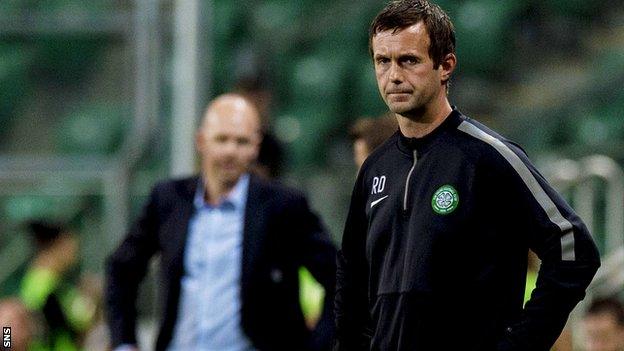
Ronny Deila suffered his first loss as Celtic manager in the 4-1 defeat by Legia Warsaw
Unpredictability remains the most elusive quality in the Scottish Premiership.
Nobody supposes that Celtic will fail to win the title for the fourth consecutive season, even if there is a new manager in place who will have to adapt to working in a different country as well as at a new club.
The presence of Ronny Deila at Celtic Park does, though, add diversity to the intrigue that the top flight is capable of.
The Norwegian was afforded a Champions League reprieve after his side lost against Legia Warsaw but a testing tie with Maribor must still be negotiated if the group stages are to be reached.
The consequence of elimination could frame the beginning of Deila's time at the club in a sense of doubt and alarm.
He has to manage the relative downsizing of the squad as he reconstructs it, although there is a strong case for clearing out players such as Beram Kayal, Amido Balde and Derk Boerrigter - a player who at Ajax built only a reputation for being injury-prone and has mostly been unfit since he moved to Glasgow.
Even so, the demand is for consistent success, and domestic competition might prove to be a safe haven for Deila.
Cup competitions can always be perilous, but the league has not provided Celtic with a period of sustained anxiety since Rangers left the top division in 2012.
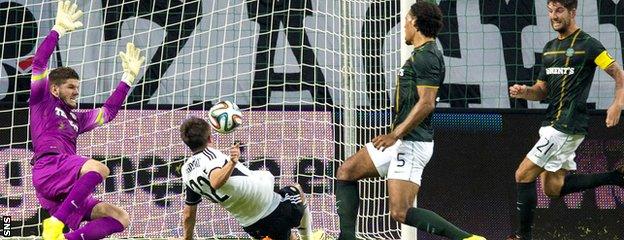
Miroslav Radovic scores his second as Legia Warsaw beat Celtic 4-1 in Champions League qualifying
There might be difficulties to overcome at the outset, but Celtic call upon greater resources and strength in depth. A recalibration of the squad alone would not reduce that advantage, although a prolonged period of upheaval under Deila would narrow the gap.
The expectation, nonetheless, would always be that Celtic would prevail over time.
Aberdeen are best placed to challenge, since Derek McInnes has constructed a rugged, solidly dependent side that has swift, incisive attackers in Niall McGinn, Peter Pawlett, Johnny Hayes and Adam Rooney.
McInnes built a mood of promise last season, and lifting the League Cup to earn the club's first trophy in 24 years confirmed that the progress was significant.
He has added to his options with the signing of David Goodwillie, while victory over Groningen in the Europa League qualifiers re-emphasised that the manager's blend of defensive organisation and counter-attacking with pace and intent could raise the team's results above expectation.
Aberdeen defeated Celtic in the Scottish Cup and in the league last season, but maintaining that over a campaign would likely be too demanding.
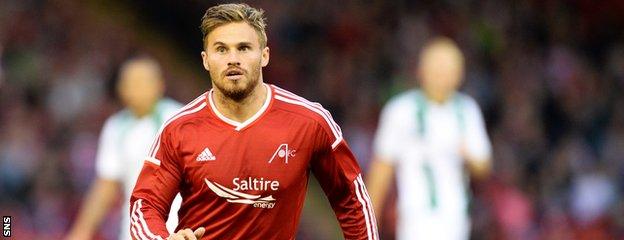
Aberdeen have brought in striker David Goodwillie to bolster their already impressive attacking options
It would, for instance, need to be a collaborative effort, since other sides would have to consistently take points off the defending champions to bring competitiveness to the title race.
Neither Motherwell nor St Johnstone have improved their teams during the close season, with finances too restricted to allow wholesale upgrading.
The reliance will remain on the nous of their respective managers, Stuart McCall and Tommy Wright, and that was sufficient enough to guide both clubs into Europe last season.
They will continue to be effective, but the opportunity lies with Dundee United to improve on last season.
The departures of Ryan Gauld and Andrew Robertson have robbed the Tannadice side of two of their brightest young talents, but also allowed the manager Jackie McNamara to refurnish his squad, since almost £6m was banked from the sales to Sporting Lisbon and Hull City respectively.
United continue to invest in young talent, bringing the likes of Charlie Telfer and Blair Spittal to the club this summer, but other signings such as defender Callum Morris, Dutch striker Mario Bilate and Jaroslaw Fojut, a Polish centre-back, will need to be immediately commanding.
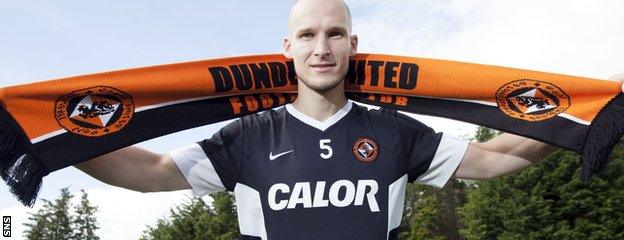
Jaroslaw Fojut is one Dundee United's new recruits, with Ryan Gauld and Andrew Robertson leaving
McNamara has proved a shrewd manager, particularly in guiding the development of young players, but there is still room for other motivations.
He will be smarting from losing the Scottish Cup final last season to St Johnstone. With financial stability having been secured off the pitch, the focus will be on maintaining momentum on it, and United are capable of achieving more than last term.
Congestion is likely to gather the rest of the teams together, since they are of a similar level. Form, mood and circumstance will determine how they are separated.
Clubs could generally rely on Hearts finishing bottom last season, given their points deduction for being in administration, so anxiety may be more prevalent in this campaign.
Kilmarnock will miss the regular supply of goals that Kris Boyd provided, but Allan Johnston has added experience and determination to his squad with the signings of Jamie Hamill,Josh Magennis and Lee Miller, while Inverness Caledonian Thistle ought to be less erratic now that John Hughes has been able to impose his own tactics and style on the squad, rather than changing the approach mid-season.
Partick Thistle still look short of a striker who can turn their comfort in possession into something more decisive, but will feel more streetwise to the demands of the top flight having stayed up last season.
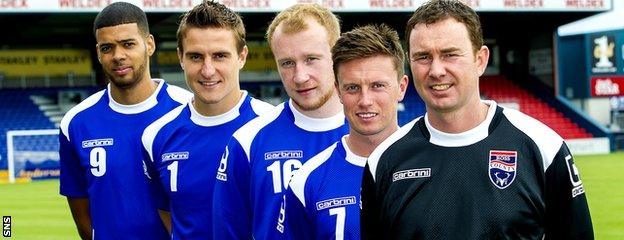
Ross County manager Derek Adams with new signings, left to right, Jake Jervis, Antonio Reguero, Liam Boyce and Joe Cardle
Ross County have been busy in the transfer market, Dundee have been stockpiling new additions in preparation for their return to the top tier and St Mirren, under Tommy Craig, have been boosted by midfielder Kenny McLean signing a two-year contract extension.
Hamilton are being more measured, since the club's stance is to remain committed to their long-standing focus on youth development and expanding their reach into the local community.
That modest strategy immediately leaves them appearing the most vulnerable side in the division, although integrating all of his new players could initially be troublesome for Dundee manager Paul Hartley.
A small handful of teams might bunch together behind Celtic, and a further group will contest the fight against relegation.
Drama and excitement will eventually emerge at the bottom of the league, as the end of the season looms and teams look frantically to save themselves, but otherwise the top-flight will fall into a familiar pattern.
- Published7 August 2014
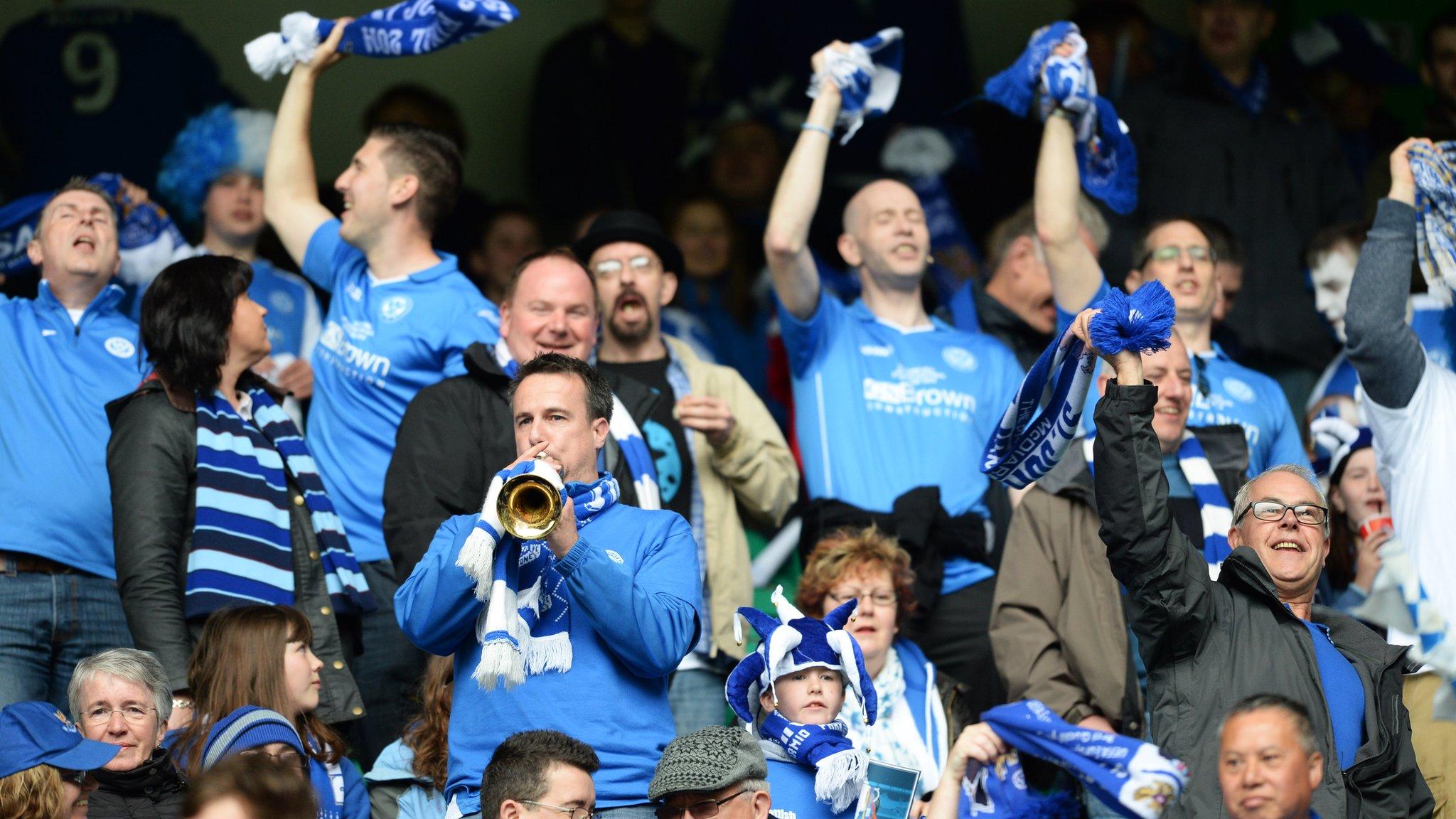
- Published6 August 2014

- Published7 June 2019
